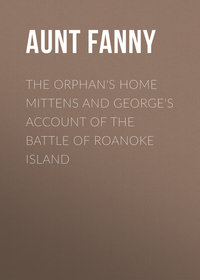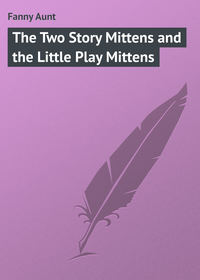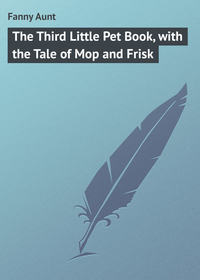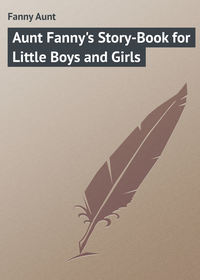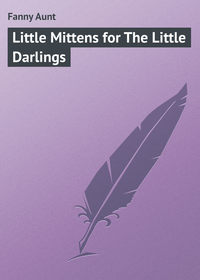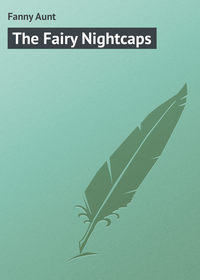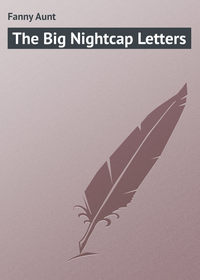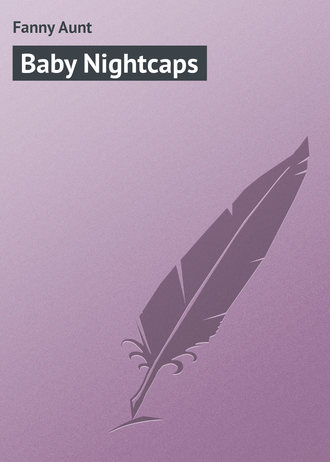 полная версия
полная версияBaby Nightcaps
Her father laughed, and gave her the cakes, and while she was enjoying them, she cried to Willie:
"I'm learning to spell and read, Mr. Willie."
"Is you?" answered Willie, "why for?" and in his earnest attention to this announcement, he forgot the way to his mouth again, and landed a spoonful of hominy on the end of his nose.
Lillie laughed, and polished his nose with her napkin; and rubbed it so hard, that it made Willie wink, and said:
"Because people must learn to read and spell, and you must learn too – I'm going to teach you; come, spell 'cat.'"
"But I tant," said Willie.
"But you must," said Lillie, "you must spell 'cat,' and you must learn to read the Bible; and you and I will read the Bible every single morning, and a great many times besides."
"Come, begin: spell 'cat.'"
Willie looked gravely down, with very large eyes, at the cat, as if he thought that she might tell him; then lifted his mug, on which was elegantly painted, with about twenty-seven flourishes, the words, "For Willie," to his lips, and took a long drink of milk, staring over the top of it at the cat the whole time, but the blinking old tabby only dozed away with one eye opened, and slapped her tail on the carpet as if to say, "you'll find no spell in me," so Willie put his mug down, and drawing a long breath, lisped again, "But I tant."
"Well," said Lillie, a little provoked, "if you can't spell 'cat,' spell 'kitten:' that's littler."
This made a great laugh round the table, and finally Lillie had to teach Willie how to spell this difficult word, and she repeated the lesson so often, and so kindly, that before an hour, Willie could spell "cat" just as well as Mr. Appleton himself! think of that! and he (Willie, not Mr. Appleton) was so proud of his new accomplishment, that he took an opportunity to run away, and his nurse went hunting after him, and found that he had scrabbled down the stairs backwards, which was his way of getting down in the world, (and I'm sure it is better than plunging headlong, as some people do,) and trotted into the kitchen to teach the cook and a little butcher boy who had just brought in the dinner, to spell "cat," and asked her in return for this kindness, to make him a "turnover pie," which you may be sure she did.
A few days after this, the joyous Christmas came, the day on which our blessed Saviour was born, when everybody ought to be grateful and joyful, if they possibly can.
On this day, Annie, Lillie, and Willie were in perfect ecstasies, so many kisses, and so many presents poured in upon them, and all tokens of so much love; that made the charm.
Lillie, especially, was enchanted with two rings she received; a pretty gold ring, and one of red cornelian. Only think! the grandeur and dignity of two rings at once, on her little white fingers! the very idea set her singing and skipping with joy. "Dear me," she said, "two wedding rings! how delightful! I shall begin a play 'mediately. Come, Annie and Willie, let's play I was a grand lady dressed in two rings, coming to make you a visit." Accordingly, Annie spread herself out as wide as she could, and Willie, as he didn't happen to wear a hoop, concluded to spread himself up as high as he could, which he effected by putting on a "sojer cap" with a long feather, and they sat up in state to receive the company, and had a splendid time, when the two rings, and the lady, walked majestically in.
The next day, a lady called upon Lillie's mother, and said, "How did Annie like the ring I sent her?"
"Annie? Lillie, you mean."
"Oh, no," said the lady, "I sent the cornelian ring to Annie."
This announcement troubled Lillie's mother. She knew her little girl thought more of this cornelian ring, than of all the rest of her presents; but she promised the lady, who was their cousin, it should be given to the rightful owner.
Now, this good mother would gladly have bought another ring for Annie, and let Lillie keep her treasure, but that would not have been the right thing; so she took Lillie out walking with her, and as the little girl skipped and danced along, (for a little happy creature like that, scarcely ever walks,) she began her painful duty by saying, "Lillie, what is the golden rule?"
"I know," said Lillie, "Do as you would wish to be done by."
"Well, do you understand what it means?"
"Why, yes, mamma; papa says the golden rule means, that I must be good and kind to everybody, because I always want everybody to be good and kind to me."
"Well, Lillie," said her mother, in a very kind tone, "I must tell you about a mistake I have made. I am very, very sorry for it. I gave you two rings on Christmas day, and your cousin tells me, that she meant the cornelian ring for Annie. Now, Lillie, what will you do?"
"Oh, mamma!" exclaimed Lillie, and then she stopped, while a painful flush came all over her face, her little breast heaved, and her large and lovely blue eyes filled with tears. She felt very miserable, for a moment, then checking a rising sob, she said, softly —
"Mamma, you made two 'steaks. You said Christmas day, that I had too many presents; that was one 'steak, and Annie had too few, that was two 'steaks. I – I must give this ring to sister Annie. It is her ring. I shall only have one ring, but, never matter," and she sighed – and then she smiled.
"That is right, my darling," answered her mother, "that is doing just as you would wish to be done by."
So Lillie, with her great resolution filling her noble little heart, said not a word more, but hastened home with her mother, and walked straight up to Annie, with such a heaven-sent smile illuminating her sweet face, and took the precious ring off her finger, and said, "Here, Annie; this is your ring, take it; it was meant for you all the time, but mamma didn't know it," and here the rosy lips began to tremble, and Lillie was silent.
"Would you rather I should take it?"
"Yes," said Lillie.
"Well, then, I will. If I had got the two rings by mistake, I should have given one to you right away! indeed I would, Lillie."
"Would you?" answered Lillie, brightening wonderfully, "well, then, I am glad I have given it to you," and the painful shadow passed away from her face, and Willie was so impressed with this interesting scene, that he forthwith brought out one of his dearest treasures, a horse with a tail like a water-spout, drawn for him by his father, which he had painted such a bright apple green, that it set your very teeth on edge only to look at it, and bestowed it then and there upon Lillie, with a hug and a kiss, that was worth all the green horses, and brown ones too, in the universe; and thus happiness was restored to the hearts of these three lovely children, and Lillie got along like other people, with only one wedding ring, and came to think it quite enough; but that I believe is the general opinion, though I am not absolutely certain.
And now, if you little folks cannot see by this story, the good effects of setting a good example, and how great the responsibility even little children incur in their relation to each other, Aunt Fanny will have a heart-ache, and she will be brought to wish, that instead of writing stories that do no good, she had taken to growing pumpkins or hard-hearted cabbages, and that's all.
JACK AND HIS FRIENDS
Once upon a time, there was a little boy, named Jack. He lived in a house with his papa and mamma, who were so fat that they had to be very good-natured, because you know, it don't answer at all for fat people to be cross, it makes them feel so very uncomfortable. So it does everybody else, for the matter of that! Who likes to see any one cross or angry, with a face flaming with rage, and talking in so sharp a voice that it sounds like a pack of fire-crackers, going off? Why, nobody. So, suppose you and I try which can keep the brightest and sweetest face all this next year. Will you? you dear little thing!
Well, Jack had a pretty little brown dog, named Carlo, and a nice little white cat, named Minnie; and Jack the boy, and Carlo the dog, and Minnie the cat, were the best friends, and had the greatest fun together, that ever a boy, and a cat, and a dog had, since the world began, and a little before.
When Jack had eaten his pudding, and Carlo had munched his bones, and Minnie had lapped her milk, they would all rush out in the garden together, as if they were distracted with joy; and then such a hurrying, and a scurrying, and a scampering, and a scattering, and a cutting round corners, and a hiding under bushes, and a jumping out of unexpected places, was never seen or heard of, I do believe. Wasn't it funny? Did you ever have such fun?
One day, Jack's father and mother had gone out to spend the day with Mr. and Mrs. Thingumbob, and the cook forgot to give the poor little boy his dinner.
Into the kitchen he rushed, and nearly tumbled head first into a tub full of soap-suds. If he had, I couldn't have finished this story, which would have been a pity. But he did not fall in; for he immediately shouted out – "Mary! Mary! Mary! I want a piece of bread and butter! I want my dinner!"
"But you can't have your dinner yet," said the cook; "I'm just making the dumpling; the baker has not come, and there isn't a speck of bread in the house."
"Well, give me a piece of cake then," said Jack.
"Haven't got any cake," said the cook.
"Well, candy then," said Jack.
"Haven't got any candy," said the cook.
"Well, sugar, or sweetmeats, or something; I'm just as hungry as a little bear," said Jack.
"Haven't got 'em, Master Jack," said the cook; "but I tell you what! here is a penny; go to the baker that lives on top of the hill, and buy a loaf of bread for yourself."
"Oh, yes! so I will!" shouted Jack, jumping over a chair and upsetting the knife-board, and all the knives which the cook had just been cleaning; and this provoked her so, that she caught up the broomstick, and ran after him, and fell over the wash-tub herself; so Jack got off safe. Aren't you glad?
Then he called Carlo, the dog, and said – "Look here, Carlo; do you want to go to the baker's with me to buy a loaf of bread?"
"Bow, wow, wow," said Carlo; which meant, "Of course I do. Hurrah!"
Then he called Minnie, the cat, and said – "Look here, Minnie, do you want to go to the baker's with us to buy a loaf of bread?"
Minnie opened her eyes, stiffened her tail, and made her back as round as a hoop, and said, miau! miau! miau! which was cat-talk for "Of course I do. Hurrah!"
So they all started off together in a state of perfect delight. Presently, they came to where Bunny the rabbit lived.
"Bunny, Bunny," called Jack. Out popped little Bunny, flapping his long ears, and winking his red eyes, and gave a funny little squeak; which meant, "How-de-do, Jack, what do you want?"
"Bunny," said Jack, "do you want to go to the baker's with us to buy a loaf of bread?"
"Oh! of course I do," squeaked Bunny. So Jack the boy, and Carlo the dog, and Minnie the cat, and Bunny the rabbit, made quite a party.
Pretty soon they came to Jenny Wren's house, high up in a tree. "Jenny, Jenny," called Jack.
Out she popped from her nest, where she was sitting on top of her children, and jumped on a branch, and wagged her little head, and fluttered her little wings, and cocked up her little tail in the air, to show how glad she was to see her friend Jack.
"Jenny," said Jack, "do you want to go to the baker's with us to buy a loaf of bread?"
"Chip, chip, chip," said Jenny; which was bird-talk for "Oh! of course I do."
"Well, come along, then," said Jack. Down flew Jenny, and hopped along with the rest. So Jack the boy, and Carlo the dog, and Minnie the cat, and Bunny the rabbit, and Jenny the wren, made a jolly little party, all going to the baker's together. I wish I had been there, don't you?
Pretty soon they came to where Ninny the goose lived. "Ninny, Ninny," called Jack; "do you want to go to the baker's with us to buy a loaf of bread?"
"Gabble, gabble, gabble," said Ninny; which was goose-talk for "Oh! of course I do;" and she flapped her wings, and stretched out her long neck, and made more of a goose of herself than ever, and was so glad at getting the invitation, that she created quite a hullabaloo with her gabbling; but for all that, Jack the boy, and Carlo the dog, and Minnie the cat, and Bunny the rabbit, and Jenny the wren, and Ninny the goose, all talking together, made a most enchanting party. They were all nice people; no owls, or tigers, or cross old cooks with broomsticks, or grisly bears. No, indeed! They were all perfect darlings; and were quite ready to travel to the very top of the North Pole, if there was any fun to be found there.
But the baker lived considerably this side of the North Pole, on the very top of a steep hill; and up they all ran, and hopped, and leaped, and jumped, till they got to the house.
But when they arrived there, they found the front door locked.
So Jack began to knock, and Carlo began to bark, and Minnie began to mew, and Bunny began to squeak, and Jenny began to chip, and Ninny began to gabble; but for all the knocking, and barking, and mewing, and squeaking, and chipping, and gabbling, nobody came to the door; and poor little Jack began to think he would never get his loaf of bread after all.
All of a sudden, Jack thought of the back door. Off they hopped, and ran, and leaped, and jumped, to the back of the house.
The hill went down on this side perfectly straight, like the side of a house, and there was scarcely room for them to stand.
Dear me! that door was locked too. So they each began again to knock, and bark, and mew, and squeak, and chirp, and gabble, as hard as ever they could; all crowding round the door in a bunch.
Just as they were making all the noise they could, suddenly – open flew the door! and out jumped a tremendous DOG!!! right into the middle of them, growling, and barking, and making his great white teeth snap together like a pistol shot!!
Frightened to death, Jack tumbled backwards over Carlo; Carlo tumbled backwards over Minnie; Minnie tumbled backwards over Bunny; Bunny tumbled backwards over Jenny; Jenny tumbled backwards over Ninny; and they all tumbled head over heels down the steep hill, with the tremendous DOG on top of the heap; and that's the last I ever heard of them.
"Oh! aren't you sorry?"
LITTLE HELEN
One day last spring when Aunt Fanny was in Charleston, she was walking up Meeting Street. Just before her she saw a pretty little girl, almost as white as snow, carried in the arms of a tall black woman, nearly as black as ink.
Aunt Fanny went softly up behind them, and heard the old nurse say – "You make nurse shame, for carry such a big girl."
"But I so tired," said the little thing. "O my!"
"How much you tired?" said the old black nurse.
"I tired a dollar," said the child.
Then Aunt Fanny laughed, and went up to her, and said – "Get down my little kitten, and walk with me."
So the nurse put her down, and she took hold of Aunt Fanny's finger, and trotted along, quite pleased.
"What is your name little one?" said Aunt Fanny.
"My name Helen, and I'm mamma's dear little baby. Here's my house; come in my house, do, please?"
So she pulled Aunt Fanny in; and there at the side of the house was a large yard, and in it was such a lot of little children! all playing soldiers together; some were white; – they were Helen's sisters and little brother; – and some were black; they were old nurse's children; and they were having such a nice time; and the last little black boy was ringing the dinner bell. Aunt Fanny was glad enough to see them, but she could not stay; so she kissed Helen, her little new friend, and went away down the street, and that's the whole of this story – there!
HOW LITTLE SUSIE WAS LOST AND FOUND
Once upon a time there was a little old gentleman, very old indeed; his hair was as white as snow, his eyes were dim, and he had no more teeth than a baby. As to his ears, they were no use to him at all, for he could not hear a single word that was said. You might have fired off twenty cannons close to him, and he would not start half as much as when some one comes behind you, and says – Boo!!!
What a pity! because he was such a kind, little old gentleman. If he saw a little child like you, he would smile, and put his hand in his pocket, and take out a piece of candy, and say – "Do you love candy?" then the child would say – just what you would say, if anybody should ask you —you know. Then the little old gentleman would say – "I can't hear you, but I know you love it, so here is a famous piece for you."
One day the little old gentleman thought he would take a walk; so he put his hat on his head, his great coat on his back, his spectacles on his nose, took his cane in his right hand, and off he went.
It was a bright, cold day in spring; the little birds were very busy building their nests, but he could not hear them chirping to each other so sweetly. Indeed, he could hardly see them. Poor little old gentleman!
As he was walking quietly along, he felt something very soft take hold of his hand, and grasp it tight. What do you think it was? He looked down, and there walking by his side, and holding his hand, was a tiny little girl.
She was looking up in his face, with her sweet blue eyes; her little bonnet had fallen back, and the fresh wind was blowing her pretty curls all about.
"My name is Susy," said the little girl; "please take me home; mamma will say – 'Where is little Susy?'"
"I can't hear a word you say," answered the little old gentleman.
"Well, then, take me home 'ight away," said Susy; "mamma can hear what I say. Please take me home, grandpa."
The dear little thing called him "Grandpa," because she thought all old gentlemen must be grandfathers.
"I can't hear a word, my poor child; I am deaf. Oh dear! what is it she wants? she must be lost," said the poor little old gentleman.
"Yes, I am lost," said the child; "and mamma wants Susy. She can't do without me. Papa, too. I'm his little mouse. I bring him his slippers when he comes home, and I sing to him about 'Three little kittens, lost their mittens.' Come, grandpa, take Susy home; ah, do;" and she looked up into his face with a sweet, coaxing smile, and clasped his hand tighter with her soft and pretty fingers.
"Oh, dear! oh, dear!" said the little old gentleman, "if I only could hear! But I can't! I am deaf."
So they walked along quite a distance, through the green lane, where the tender grass looked so dewy and fresh, and the first spring violets were peeping up; but no one came in sight, and the little old gentleman in his trouble, looked north, south, east and west, for somebody to come that could hear what the little one said.
All at once he thought, I will ask God to help me; and he said aloud, in a voice trembling with age – "Oh, my Heavenly Father! help me to find assistance for this tender little lamb."
When Susy heard him say that, her rosy lip began to tremble, and a great tear came into each of her blue eyes. Poor little darling! she knew something was wrong, but she did not understand why he could not hear her. She could hear him, and she did not know what it meant, to be deaf.
But now, as if in answer to the prayer, a carriage was seen approaching; and the little old gentleman said – "Don't cry, my little one; here, eat this candy, and don't cry. I will get you home safely."
As the carriage came near, he saw that there were two ladies inside, and he held up his hand and beckoned them to stop. One of them was a kind-looking lady, with soft gray hair; and he said to her —
"Madam, I am deaf. I cannot hear a single word. I was taking a walk, when this little child came up and put her hand into mine. I think she is lost; but I cannot hear what she says. Will you take her with you, and restore her to her home?"
"Certainly, I will, poor little darling," said the kind lady; and the door was opened, and Susy tenderly lifted in, and placed on the lady's lap.
The little old gentleman kissed Susy, and thanked the ladies; then taking off his hat, he made them a low bow, and then they drove away.
"Can you tell me where you live?" said the lady.
"Oh, yes; I live with mamma and papa," said Susy, "and my kitty, and my doll; we all live together."
The lady smiled, and said – "Well, dear, we'll try to find them." So they rode on a little way, and soon came where the houses were nearer each other. Susy looked out of the carriage window, and did not cry any more; because she thought she would very soon see her dear mamma.
Suddenly she screamed – "Mamma! mamma! here is Susy." Sure enough! there was a lady hurrying along; looking in every direction. As soon as she heard Susy, her face lost its troubled expression, and she ran to the carriage door, and opened it, caught her little child, and hugged her to her breast, and said – "Oh, my darling! my darling! Thank God you are safe!" and then she burst into tears – tears of joy and gratitude.
The kind ladies told her how Susy had strayed away into the green lane; and how the little deaf old gentleman had given her to them to take home; and Susy's mother thanked them again, and again; and carried her precious child home.
What a kissing Susy got that evening from her father! and how glad he was that his little girl was there to bring him his slippers! They did not get angry with her – of course not! Dear me! who ever heard of such a thing? She did not mean to do wrong; she had just wandered off, singing a little song, and talking to herself, and picking the pretty butter-cups that grew in the grass; and when she looked up, she could not see her home; she only saw the little old gentleman that she called "Grandpa."
So her papa and mamma talked kindly to her, and kissed her, and made her promise that she would not go so far again – never! never! never! which little Susy was very glad to do, for she had no idea of losing her dear parents. No, indeed.
But after that, she saw the little deaf old gentleman very often; and he grew to love little Susy dearly; and though they did not talk to each other, they smiled; and he always had something in his pocket for her. Guess what it was? Candy? Yes, that was the very thing.
Sometimes he would come to her house, riding on a nice old white horse; and Susy would run out and smooth down his nose; the horse's nose I mean; and the old white horse liked it very much; he would not have bitten her little hand for a thousand dollars; and ever after that Susy, and the little old gentleman, and the old white horse, were called – "The Three Friends;" and that's the end of this story; rorum corum torum. How do you like it?
THE END

